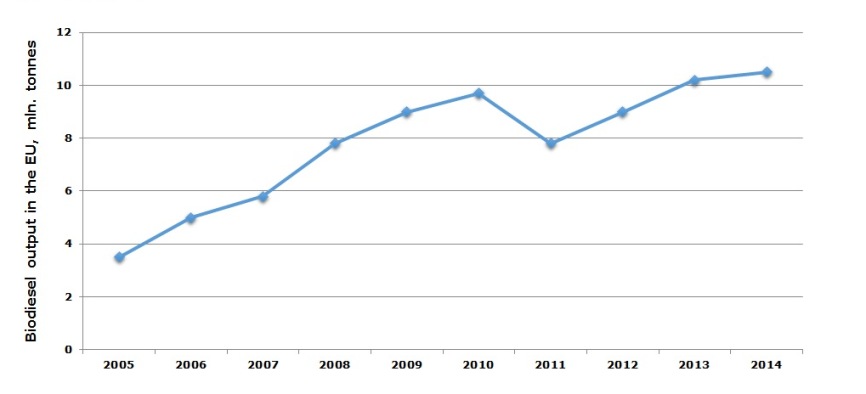Policy making and regulation play a central role in the future development of biodiesel market in many regions of the world. It is also quite common that public opinion, at least in democracies, is instrumental in shaping the national and international policies, thus driving environmental regulation in many countries. Higher biofuel blends in transportation fuel are now an objective of many governments so they put their best efforts to decrease the consumption of conventional hydrocarbons and to improve the fuel efficiency of vehicles. In the USA, biodiesel, when compared to petroleum diesel fuel, has a capacity to reduce GHG emissions by 50-85 percent. The policy to promote biofuels, including bioethanol and biomass-based diesel, finds manifestation in numerous laws, directives, standards, taxation initiatives, subsidies, etc. Currently, European biodiesel production capacity and output exceed 23 mln mt/y and 10 mln mt/y, respectively.
Biodiesel: production dynamics in the EU countries during 2005-2014

The analogous upward trend is palpable in the United States. In 2015, biodiesel output in this country was over 63 mln mt/y, though the rise in biofuel imports by the US can adversely affect domestic biodiesel production. The Renewable Fuels Standard (RFS) obliges refiners and fuel importers to increase the amount of biofuels in petroleum blends in the USA, which lays strong foundation for the development of the sector. However, the introduction of biofuels is not a universal and steady process. The implementation of generally favourable attitude to greener fuels can be problematic even in developed countries, let alone developing nations. For instance, the inability to introduce higher biodiesel blends in transportation fuel in Malaysia and a hike in local export tax for this product rendered a negative impact on the Malaysian biodiesel market. Likewise, in Russia, despite general support and recognition of the important role of biofuels, the promotion of biodiesel and bioethanol in this country is subdued by the lack of blending-related legislation, fiscal policies and insufficient support of agricultural and industrial entities, which may be interested in the biofuel sector.
A comprehensive analysis of the world biodiesel market is available in the in-demand research report “Biodiesel: 2016 World Market Outlook and Forecast up to 2020”.
